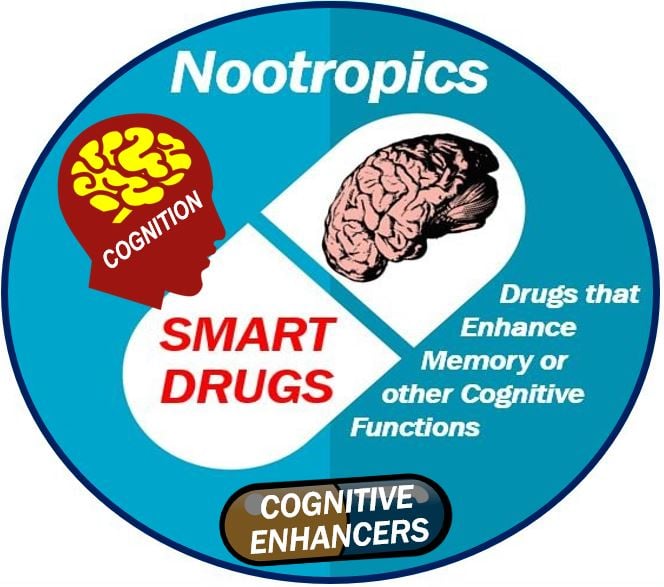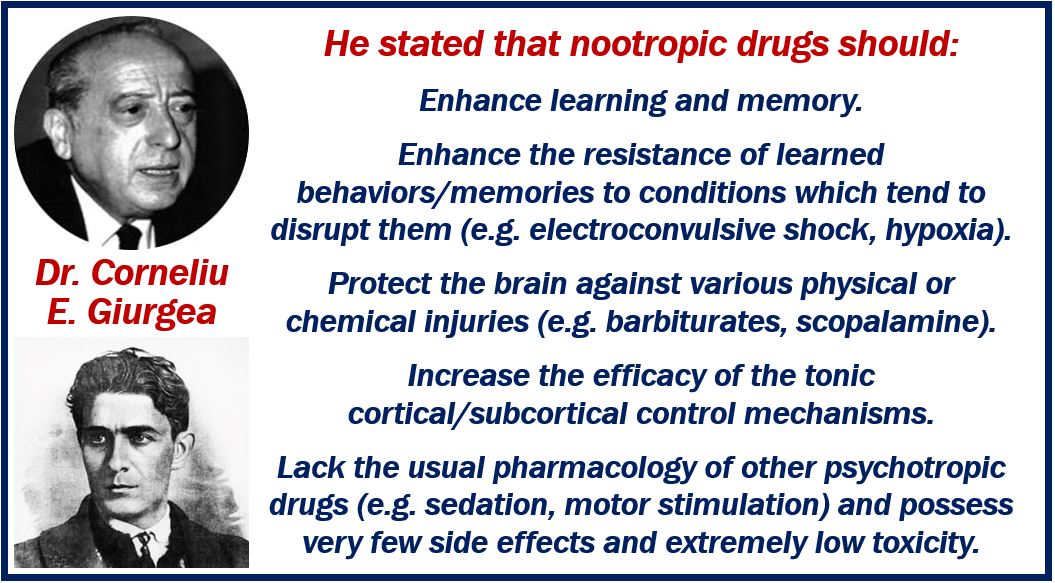Nootropics are substances such as supplements or drugs that boost memory and overall cognition. They also help enhance the learning process. People commonly refer to them as smart drugs or cognitive enhancers. Cognitive is the adjective of cognition, which means ‘perception, the process or act of knowing.’ Something that enhances your cognitive performance improves your brain power.
As modern work and academic pressures intensify, nootropics have garnered attention for their potential to meet the increasing demands for mental stamina and agility.

Memory, executive function, creativity, and motivation
A nootropic may enhance creativity, motivation, memory, and executive function in healthy individuals. Executive function comprises a set of mental skills including self-control, flexible thinking, and memory. We use these functions daily to work, learn, and manage our everyday lives. People with executive function problems may find it difficult to concentrate (focus), follow instructions or directions, and also manage their emotions.
There are many websites that make nootropic claims about their substances. However, research is still at a preliminary state, i.e., the effects, harms, or therapeutic benefits of most of these substances are unclear.
Webmd.com says the following about the term’s meaning:
“The term nootropics first referred to chemicals that met very specific criteria. But now it’s used to refer to any natural or synthetic substance that may have a positive impact on mental skills.”
Types of nootropics
There are three main types of nootropics:
-
Prescription Drugs
These include most of the stimulant drugs such as Adderall and Ritalin. Modafinil, a non-stimulant medication, is also in this category. They are typically prescribed for patients with ADHD (attention deficit hyperactivity disorder).
However, because they boost awareness and cognitive function in the general population, there is great demand for them among students.
-
Dietary Supplements
Examples include amino acid creatine, herbal ginseng, and caffeine. They are OTC products or substances. OTC stands for over-the-counter, i.e., no medical prescription is required.
-
Synthetic Compounds
Noopept (N-Phenylacetyl-l-prolylglycine ethyl), for example, is in the synthetic compounds category. It allows acetylcholine to build up at higher than normal levels. Acetylcholine is vital in the function of memory. Noopept is banned in the US, UK, and many other countries.
Studies have identified cognitive benefits in some products from all three categories. However, prescription medications, according to peer-reviewed research, far outperform synthetic compounds and dietary supplements.
Despite their varying efficacy, the global interest in nootropics continues to grow as individuals seek to gain a competitive edge in cognitive performance.

Etymology of nootropics
Etymology is the study of the origin of words and how their meanings evolved over time.
According to Wikipedia, the term comes from νόος (nóos), the Ancient Greek word which meant “mind,” and τροπή (tropḗ), which meant “a turning.”
Dr. Corneliu E. Giurgea (1923-1995), a Romanian psychologist and chemist, coined the term in 1972.
Do your research
In a previous article of ours about nootropics, Edward Bishop wrote:
“Make sure that whatever you choose to buy is safe and that you have researched it carefully. Remember that what works for one person may not be the case for somebody else. Just because a website makes a therapeutic claim, does not necessarily mean that what they say is true.”
Nootropics – vocabulary and concepts
There are many compound phrases related to nootropics. A compound phrase is a term that contains at least two words. Let’s have a look at some of them, their meanings, and how they are used in a sentence:
-
Nootropic Stack
A combination of nootropic substances taken together to enhance cognitive function.
Example: “To maximize his mental clarity, he researched and created a personalized nootropic stack.”
-
Nootropic Supplement
A dietary supplement that claims to improve cognitive functions, such as memory and focus.
Example: “She added a nootropic supplement to her morning routine to help with her studies.”
-
Nootropic Compound
A specific chemical substance that falls under the category of nootropics, with effects on cognitive abilities.
Example: “The scientist was studying the effects of a newly synthesized nootropic compound.”
-
Nootropic Effects
The impacts or changes associated with the consumption of nootropics, usually referring to cognitive enhancement.
Example: “He was skeptical about the nootropic effects claimed by the advertisement.”
-
Nootropic Market
The commercial environment or sector dealing with the sale and distribution of nootropic products.
Example: “The nootropic market has seen a surge in demand as more people seek cognitive enhancers.”
-
Nootropic Research
The scientific study and investigation into the efficacy, safety, and mechanism of action of nootropics.
Example: “Ongoing nootropic research seeks to validate the cognitive benefits reported by users.”
Video – What are Nootropics?
This video presentation, from our YouTube partner channel – Marketing Business Network, explains what ‘Nootropics’ are using simple and easy-to-understand language and examples.
